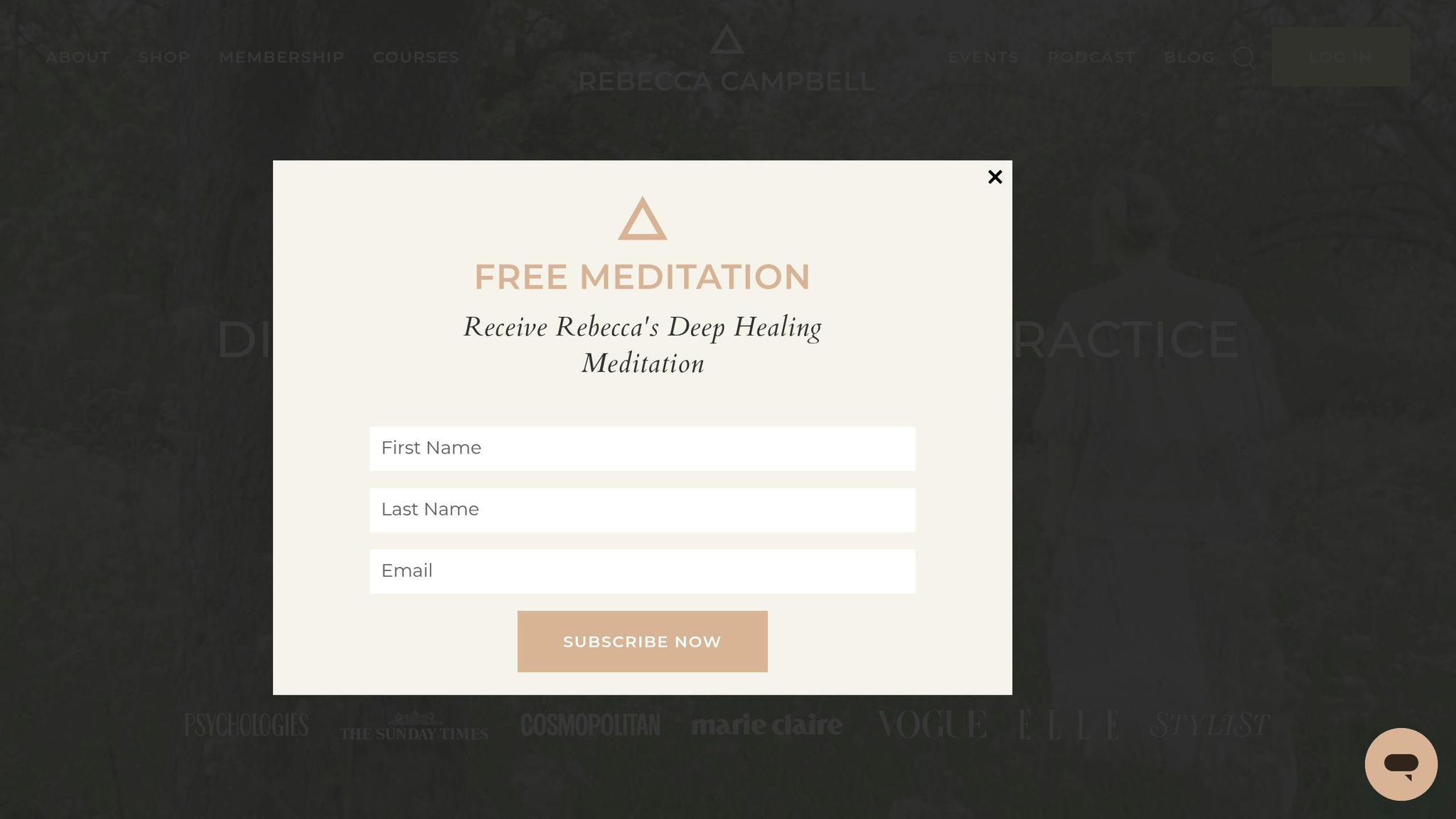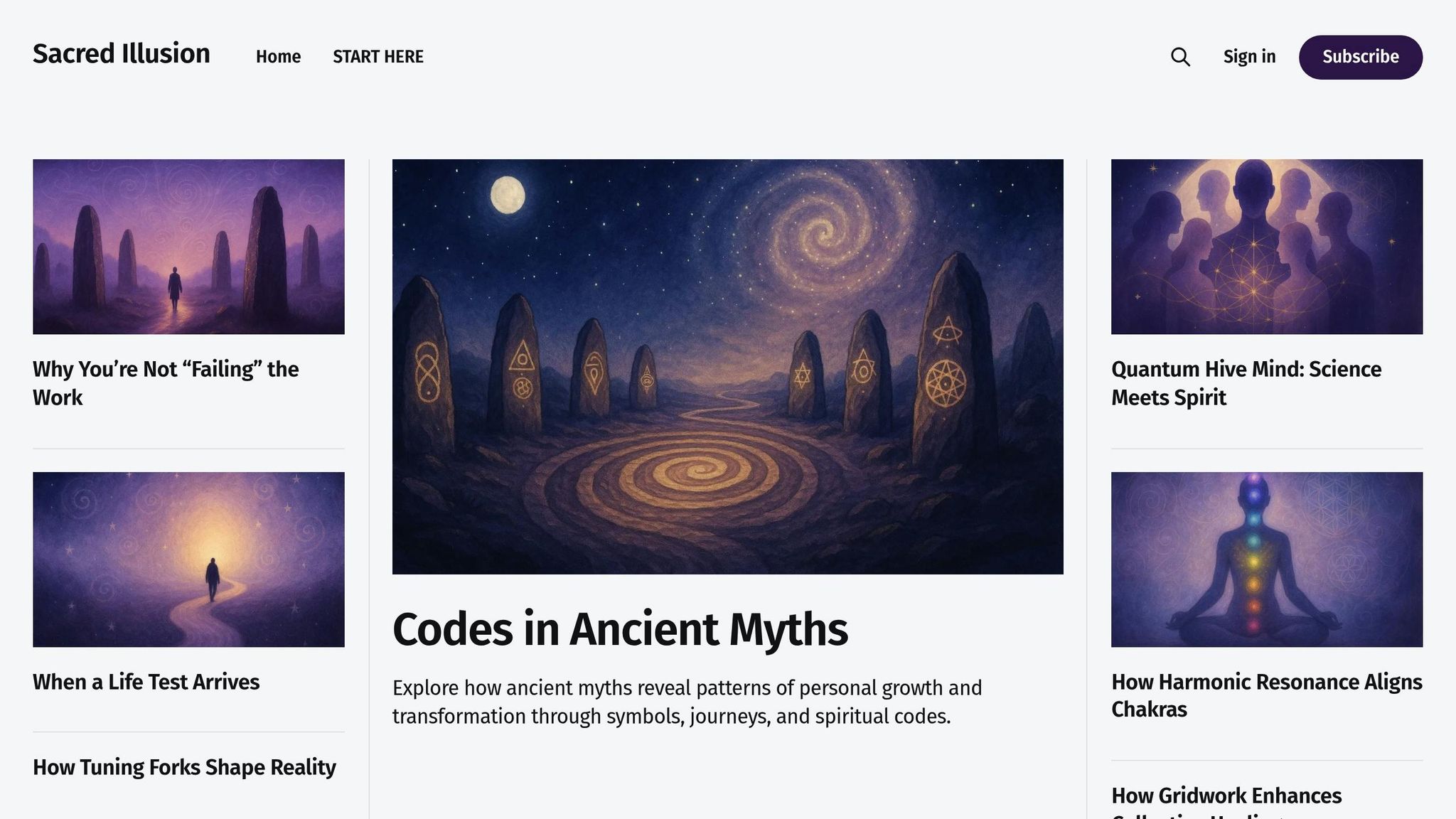Modern Mystery Schools: Online or Off?
Explore the evolving landscape of mystery schools, comparing online and in-person experiences for spiritual learning and community engagement.

In the evolving landscape of spiritual learning, mystery schools now offer two main paths: online and in-person. Each has its own strengths and challenges, shaped by accessibility, cost, experience, and community.
- Online schools bring ancient teachings to anyone with internet access, offering flexibility, lower costs, and global connections. Tools like live streaming, digital libraries, and tailored learning paths make sacred knowledge more accessible than ever. However, they may lack the energy and depth of physical gatherings.
- In-person schools provide immersive experiences with face-to-face mentorship, group rituals, and shared energy. These settings foster deep connections and tangible practices but often require travel, higher costs, and fixed schedules.
Choosing between these paths depends on your goals, lifestyle, and learning preferences. Whether you seek the convenience of digital platforms or the intimacy of physical spaces, both paths invite you to step deeper into your spiritual journey.
| Factor | Online Mystery Schools | In-Person Mystery Schools |
|---|---|---|
| Accessibility | Global reach, no travel needed | Location-dependent, travel required |
| Cost | Lower, no travel/accommodation fees | Higher, includes travel and lodging |
| Flexibility | Self-paced, replayable content | Fixed schedules, real-time progression |
| Community | Global digital connections | Local, in-person relationships |
| Ritual Experience | Personal, individual focus | Group energy, shared ceremonies |
Which path calls to you?
Join the journey. Each choice holds its own sacred echoes, waiting to align with your soul map.
What is a Mystery School? | Returning with Rebecca Campbell Podcast

Online Mystery Schools: The Digital Path
The digital age has opened doors once thought immovable, allowing seekers across the country to explore ancient wisdom without ever leaving their homes. Online mystery schools have emerged as transformative spaces, bridging the gap between age-old teachings and modern technology. These virtual sanctuaries make esoteric knowledge accessible to those who, in the past, might never have encountered such teachings, reshaping how sacred learning is experienced.
Let’s delve into how these platforms are expanding access and introducing tools that are redefining spiritual education.
Access and Flexibility Benefits
Spiritual education is no longer confined by geography. A seeker nestled in a remote corner of Alaska can now access teachings as readily as someone living near a traditional mystery school. This shift marks a profound moment in the history of sacred learning, where knowledge once reserved for the few is now open to many.
For those balancing demanding careers, family responsibilities, or personal obligations, online platforms offer a lifeline. With 24/7 access and self-paced modules, spiritual study can fit into even the busiest schedules. This flexibility ensures that learning becomes a part of life, rather than an additional burden.
Financially, the online format also lowers barriers. Without the costs of maintaining physical spaces, many digital mystery schools can offer programs at more affordable rates. And unlike in-person sessions, online learners can revisit lessons as often as needed, deepening their understanding over time.
Digital Tools for Spiritual Education
Modern technology has brought a wealth of tools to spiritual education, enhancing the learning experience in ways that were once unimaginable. Interactive workbooks, live streaming, and mobile apps allow for continuous engagement, no matter where you are.
Live streaming brings ceremonies and group meditations into your home, creating shared experiences that transcend physical distance. Features like breakout rooms allow for small group discussions, preserving the intimacy often associated with traditional mystery schools.
Digital libraries are another game-changer, offering immediate access to sacred texts, audio teachings, and video lectures. With advanced search options, students can easily find specific teachings or explore concepts at their own pace.
Some platforms even use artificial intelligence to tailor learning paths to individual needs. By tracking progress and interests, these systems create personalized journeys that align with each student’s unique spiritual rhythm. However, even with these advances, certain aspects of traditional learning remain challenging to replicate online.
Digital Learning Challenges
While online tools provide unmatched convenience, they also bring unique difficulties. One of the greatest challenges lies in recreating the energy of physical gatherings. The shared vibrations and energy exchanges that occur in person are difficult to transmit through a screen.
Distractions are another obstacle. Unlike the focused environment of a traditional mystery school, home settings often come with interruptions - emails, family responsibilities, or the general noise of daily life - all of which can disrupt the flow of spiritual study.
Technical issues, too, can be a source of frustration. A dropped internet connection or software glitch can interrupt a meditative practice or ceremonial moment, breaking the immersion that’s so vital to spiritual growth.
The lack of immediate, in-person feedback from instructors is another limitation. While digital platforms offer tools for communication, they can’t fully replicate the subtle guidance that comes from observing body language, energy shifts, or other nuanced responses during practice.
Screen fatigue poses yet another challenge. For those already spending hours at a computer for work, adding spiritual study to the mix can lead to diminished focus and engagement.
Finally, building genuine community connections online can feel elusive. While forums and video calls create opportunities for interaction, they often lack the depth and spontaneity of relationships formed in shared physical spaces. The sense of belonging that naturally arises in group settings can be harder to cultivate in a virtual environment.
Offline Mystery Schools: The Traditional Path
For centuries, mystery schools have served as sanctuaries of sacred knowledge, offering teachings through direct mentorship and shared rituals. These in-person experiences create immersive environments where physical presence becomes a vital part of the learning and transformation process.
The traditional path stands apart from its digital counterparts by engaging both the body and mind in ways that virtual formats cannot. The shared energy of a physical space, combined with non-verbal communication, adds layers of depth to the learning experience. This contrast sets the groundwork for a deeper exploration of both methods in later sections.
In-Person Mentorship and Rituals
The mentor-student connection in traditional mystery schools operates on multiple levels. Being physically present allows mentors to observe subtle non-verbal cues, such as posture and breathing, enabling them to offer guidance that often transcends spoken words.
Rituals also take on greater significance in dedicated spaces. The act of lighting candles, burning sacred herbs, or handling ritual objects engages the senses, grounding spiritual teachings in a tangible, physical reality. When rituals are performed collectively, the presence of each participant creates a shared energy that elevates the experience.
Initiations in these settings - whether through the laying on of hands or the exchange of symbolic objects - create lasting impressions that are deeply felt. These moments often serve as pivotal milestones on a student's spiritual path.
Additionally, many traditional mystery schools emphasize the importance of lineage. Teachings passed down through unbroken chains of mentors and students add a sense of continuity and depth, connecting modern seekers to ancient wisdom.
Community and Group Energy
Physical gatherings bring a dynamic energy that is hard to replicate online. Group meditations, for example, foster a sense of unity while amplifying individual practices. Beyond the structured lessons, the bonds formed in these settings often extend into everyday life, creating a support network that enriches the spiritual journey. Shared meals, group ceremonies, and mutual encouragement during challenges become integral parts of the experience.
Group rituals performed in physical spaces - whether during a full moon, seasonal celebration, or healing circle - can evoke profound feelings of connection. The combined intentions of participants often lead to transformative experiences, deepening both individual and collective understanding.
The communal aspect of traditional schools also allows for spontaneous learning. Insights might emerge from a casual conversation after a session, or witnessing another student's breakthrough could inspire new perspectives. These unplanned moments highlight the unique, experiential nature of in-person spiritual education, offering something that digital platforms struggle to replicate.
Offline Learning Limitations
Despite their many strengths, traditional mystery schools come with practical challenges. Geographic location and rigid schedules can limit access, as students often need to live nearby and adhere to fixed class times.
Financial barriers also play a role. Beyond tuition, additional costs like travel and lodging can make participation difficult for those with limited resources.
Another limitation is the lack of flexibility. Missing a session often means relying on personal notes or waiting for the next cycle to revisit the material, as there’s no option to pause or replay a live lesson.
Selective admission practices can further restrict access. Some schools have rigorous application processes, require recommendations, or expect adherence to specific lifestyle guidelines. While these measures aim to maintain the integrity of the teachings, they may exclude committed individuals who don’t fit the traditional mold.
Lastly, group instruction often balances the needs of diverse participants. This can create challenges for both advanced students, who might feel held back, and beginners, who may struggle to keep up. The result is a one-size-fits-all approach that may not fully support everyone’s individual journey.
Online vs. Offline Mystery Schools: Direct Comparison
Deciding between online and offline mystery schools comes down to understanding how they differ in access, cost, experience, and community. Each format offers its own set of strengths and challenges, shaping the way you engage with sacred teachings.
The most striking difference lies in accessibility. Online schools break down geographic barriers, making them available to anyone with an internet connection. On the other hand, offline schools often require physical proximity to specific locations. While this can limit participation, it also fosters deeper connections within local communities.
Financial considerations also play a major role. Online programs typically reduce costs by eliminating the need for travel, accommodations, and venue fees. In contrast, offline schools often come with added expenses, such as transportation and lodging, especially for workshops or retreats.
The depth of experience varies significantly between the two. Online platforms provide structured, replayable content that allows for self-paced learning. Offline schools, however, offer an immersive experience that engages all the senses, from tactile rituals to the shared energy of in-person gatherings.
Community interaction takes different shapes depending on the format. Online schools create global networks, connecting students from across the world through digital forums and virtual group work. Offline schools, by contrast, nurture in-person relationships that often extend beyond the classroom, forming tight-knit local support systems.
Here’s a side-by-side look at these differences:
Comparison Table
| Factor | Online Mystery Schools | Offline Mystery Schools |
|---|---|---|
| Accessibility | Global reach, available anytime, no travel needed | Location-dependent, fixed schedules, travel required |
| Cost | Lower overall costs, no travel/accommodation fees | Higher costs, includes travel and lodging expenses |
| Flexibility | Self-paced, replay options, accessible on devices | Fixed schedules, attendance required, no replays |
| Community | Global connections, digital forums, virtual groups | Local networks, in-person relationships, shared experiences |
| Mentorship | Video calls, messaging, digital feedback | Hands-on guidance, non-verbal cues, in-person support |
| Ritual Experience | Personal sacred space, individual focus | Group energy, shared ceremonies, collective rituals |
| Technology Needs | Stable internet, compatible devices, tech skills | Minimal tech required, traditional methods |
| Learning Pace | Individual control, pause and review options | Group-determined pace, real-time progression |
| Sacred Tools | Individually sourced tools, personal collection | Provided materials, traditional implements |
| Lineage Connection | Digital teachings, recorded transmissions | Direct, in-person lineage, physical presence |
Online schools rely heavily on technology, requiring reliable internet and digital literacy. While these tools can offer interactive features like guided meditations and visual aids, they may exclude those without access to such resources. Offline schools, grounded in traditional methods, avoid this dependency but may miss out on the expanded possibilities of digital supplements.
Learning retention often depends on personal preferences. Some learners benefit from the ability to pause, rewind, and revisit online lessons, while others thrive in the dynamic energy of face-to-face interaction and real-time feedback.
Another key distinction lies in the initiation process. Online initiations focus on personal transformation, often conducted in solitude. In contrast, offline ceremonies draw on the power of collective energy, creating a shared, tangible experience.
These differences illustrate how each format caters to different needs and aspirations. By understanding these contrasts, you can choose the path that resonates most with your spiritual goals and learning style.
Choosing Your Spiritual Learning Path
When deciding between online and offline mystery schools, your personal preferences and circumstances play a crucial role. The path you choose will shape not only your spiritual growth but also how you experience the journey itself.
What to Consider Before Choosing
Your Learning Style
Think about how you learn best. Do you flourish with the flexibility of digital tools like visual aids and recorded lessons? Or do you find that in-person settings, with their hands-on experiences and immediate feedback, help you connect more deeply?
Time Flexibility
Consider your schedule. Online programs let you adapt learning to your own time, offering freedom and convenience. In contrast, offline schools follow fixed schedules, which can help establish a steady routine and provide a sense of accountability.
Financial Resources
Budget is another key factor. Online programs are often more affordable since they eliminate expenses like travel and lodging. However, remember to account for any additional costs beyond tuition when planning.
Community Preferences
What kind of community support do you value? Online platforms connect you with a global network of seekers, while in-person schools help nurture closer, more personal relationships within a local setting. Reflect on which environment feels more aligned with your needs.
Geographic Location
Your location can influence your options. If in-person mystery schools are hard to find nearby, online alternatives become a practical solution. On the other hand, urban areas might offer more opportunities to join local, face-to-face gatherings.
Technology Comfort Level
Be honest about your comfort with technology. Online programs require reliable internet access and familiarity with virtual platforms. If navigating digital tools feels overwhelming or distracting, an offline experience might offer the immersive focus you’re looking for.
Spiritual Goals
Let your aspirations guide you. If traditional rituals and ceremonial practices are central to your journey, offline schools might be the better fit. If you’re drawn to exploring new and modern interpretations of mystical teachings, online formats can provide that innovative edge.
By reflecting on these factors, you can choose the format that best aligns with your spiritual path.
How Sacred Illusion Supports Your Journey

Sacred Illusion is here to walk alongside you, offering thoughtful insights, practical guidance, and reflective essays on spiritual awakening and the layers of reality. Whether you’re drawn to traditional wisdom or modern interpretations, Sacred Illusion provides tools to help you integrate these teachings into your unique practice.
No matter which learning format you choose, Sacred Illusion encourages mindful exploration and empowers you to shape a path that resonates with your deepest aspirations.
Conclusion: Sacred Learning in the Modern World
Today’s spiritual education offers a blend of online and in-person opportunities, opening pathways for seekers to explore their fullest potential.
Digital mystery schools, now present in 55 countries, bring lineage-based teachings to learners across the globe. With flexible schedules and accessible pricing, these platforms align with the demands of modern life, making it possible for busy professionals and parents to pursue spiritual growth without compromising their daily commitments.
On the other hand, traditional mystery schools provide a more immersive experience. Through direct transmission, ritual practice, and one-on-one mentorship, they create a sacred space where transformation takes root. Their structured progression - from Adept to Healer, Ritual Master, and Guide - illustrates the power of shared, in-person learning.
The choice between these paths ultimately depends on your personal priorities and spiritual aspirations. Digital platforms offer global reach and convenience, while traditional schools provide profound, face-to-face engagement.
What matters most is your dedication to the journey. Whether you step into a virtual classroom or a sacred physical space, the essence of spiritual learning remains intact.
FAQs
What are the pros and cons of studying with an online mystery school compared to attending in-person?
Online mystery schools bring the convenience of learning on your terms. You can study at your own pace, from any location, and often at a lower cost. This can be a game-changer for those juggling packed schedules or living far from traditional schools.
That said, online programs might miss the mark when it comes to the personal connection and hands-on experiences that in-person learning provides. Building a strong sense of community or collaborating with fellow students can also be more challenging in a virtual setting.
In-person mystery schools, on the other hand, offer the richness of direct mentorship, immersive environments, and deeper connections with peers. However, they often come with a heftier price tag and stricter schedules. Choosing between the two ultimately comes down to what aligns best with your learning preferences and life circumstances.
How can I choose the right mystery school for my spiritual journey and lifestyle?
Choosing a mystery school is a deeply personal decision, shaped by your spiritual aspirations, daily rhythm, and how you best absorb knowledge. Begin by exploring the lineage and roots of the school, ensuring its teachings are grounded in traditions that hold meaning for you. Whether you're drawn to ancient practices, inner transformation, or honing intuitive skills, let your inner compass guide you.
Another key consideration is whether you thrive in in-person gatherings or online settings. Both have their own magic - one offers tangible connections and sacred spaces, while the other provides flexibility and accessibility. Reflect on the depth of initiation you seek, the sense of belonging within the community, and how the program fits into your everyday life. The right school will feel like a natural extension of your path, offering a foundation for ongoing spiritual growth.
What tools and skills do I need to successfully join an online mystery school?
To participate in an online mystery school, you'll need some basic digital skills. These include navigating learning platforms, using video conferencing tools, and communicating effectively through email or chat. A stable high-speed internet connection and a computer or tablet are critical for accessing materials and joining live sessions.
It’s also useful to understand how to handle common tech hiccups, like adjusting audio or video settings during virtual meetings. With these essentials in place, you’ll be ready to dive into the enriching journey of online sacred education.




